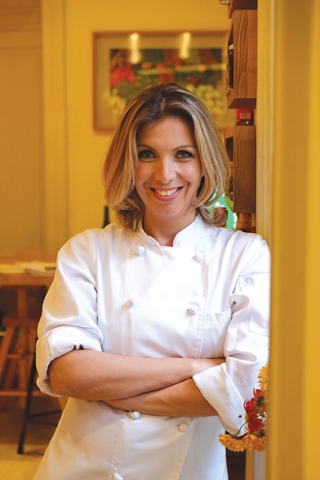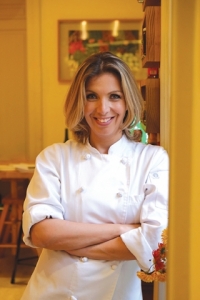Working Women: The Kings, or Queens, of the Kitchen
The difficulties women encounter in equal employment opportunities afflict even the world's most developed countries; women are almost universally paid lower wages than men. Many industries are also dominated by men, making it difficult for many women to gain a foothold.
Despite the global male-espoused stereotype of women belonging in the kitchen, few professional chefs are female, and women frequently encounter obstacles when trying to break into the culinary industry. This is equally true in Georgia, a country which already suffers from chronic sexism issues in society.
Tekuna Gachechiladze, a celebrity chef and owner of the Culinarium restaurant and Culinary Academy, recalls her early difficulties in breaking into the business in New York. “Being a chef is a far more physically demanding job than people realise. When things get tough, you can't complain; they'll just deride you for being a woman and won't take you seriously. They've seen a lot of women try and do their job and quit, so you have a lot to prove. But New York was the perfect place to start my career – I originally trained as a psychologist – even though American chefs were very aggressive in their work, far more aggressive than Georgian chefs I've worked with. But if you don't complain, get on with it and do a good job, you'll be accepted eventually.”
Gachechiladze believes that it is the physical strain of the job that dissuades many women from attempting to embark on a career in the food industry, and the doubt that many male chefs have that women can handle it. “It's a very stressful job, and to be honest men seem to be able to cope with it better. Physically at least, women are weaker, and when things get difficult many also don't have the mental strength to keep going.”
Yet she thinks that women – especially Georgian women – have the potential to replicate her success and work as professional chefs in their homeland and abroad. “On the whole I think that Georgian women are more independent than Georgian men, so I think the ability to be individually successful comes more naturally to Georgian females. We adapt more easily; I really can't imagine a Georgian man putting up with the difficulties I had in New York.”
It is this adaptability that has led to her becoming a successful entrepreneur, owning a renowned cooking school and restaurant, as well as starring in a cookery programme which bears her name. Innovation and doing things in a unique fashion are also keys to her success, she claims; anyone familiar with Georgian restaurants visiting Culinarium (Lermontov Str. 1, Tel: 32 2 43 01 03) will find it difficult to disagree with her. Designed to resemble a homely kitchen, the central communal table and charming décor make a stark contrast to the uniform appearance of most Tbilisi eateries.
Yet despite its originality, Culinarium was not initially a hit with Georgian people. Reluctance to try an experimental cooking school only operating as a restaurant twice a week and owned by a woman was a significant challenge facing Gachechiladze at first, but this has been gradually overcome, mostly thanks to the quality of her gourmet dishes.
“Originally, I didn't have many Georgian guests, but now Georgians are enjoying my restaurant too, which is an encouraging sign. It makes me feel good because it's part of my own private war against social fundamentalism, which I think is a big problem in this country. The spirit to try something new isn't found too often here; Georgians are usually afraid of new things, but I'm happy that this slowly seems to be changing.”
Keti Bakradze, another celebrity chef and owner of The Dining Room restaurant (Paliashvili Str. 38, Tel: 0322 25 09 00), attributes her own success to her strength of character and her hands-on approach to business. “I put it down to my personality and mentality. I think you have to be a bit rough and ready to succeed as a woman in this business,” she says. “You also have to keep control. I don't appoint a chef in my restaurant, I do everything myself. It's hard work, but I don't trust anyone else to run my kitchen.”
For her, a thorough understanding of the culinary business is also essential. “Oftentimes they just don't understand the industry well enough to get the best produce to sell in their restaurants. To be honest, that's true for both men and women. There's lots of problems with both wine and food quality in some restaurants, mostly because people try to run things far too cheaply and aren't prepared to pay for quality.”
Residents of Tbilisi have long become accustomed to the sight of restaurants and bars opening and closing every month, the names and logos changing, the poor service and predictable menus remaining the same. Bakradze attributes this to a simple lack of understanding of the industry.
“They just have no ability to plan for the future, and this is where it all falls down,” she says. “Nobody has any long-term plans; everyone wants to make money quickly and in the easiest way. I've been meticulous in doing exactly the opposite, and I think that has been one of the keys to my success.”
The Dining Room has been open since 2008, a long time for a Tbilisi restaurant to remain open and successful, and a testament to Bakradze's business philosophy; so, too, are her soon-to-be open bistro and delicatessen on Tapidze Street.
For women to succeed in the culinary industry, it seems that perseverance in the face of challenges is the key, whether it be in the form of Gachechiladze's liquid adaptability and original ideas or Bakradze's inexorable efficiency and business brain. As Gachechiladze herself says, “I'm a strong feminist, and I think that Georgian women have a lot of potential to succeed in this business. I would love to see more Georgian women in our kitchens. They just shouldn't give up.”
The success of Culinarium and The Dining Room are gourmet restaurants are testaments to the heights that Georgian women can reach in the culinary industry, as well as proof that the sex of the chef in the kitchen truly does not matter; quality is king.
Tim Ogden











